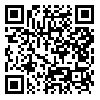Background: Cerebral palsy is the term used to describe a movement disorder though to be the result of nonprogressive brain damage. Due to damage to CNS, it is associated with articulation disorder and abnormal feeding reflex. Lack of oral function control and coordination following feeding reflex disorders. Articulation disorders are seen in most of the cerebral palsied patients.This research aimed to determine the relationship between feeding reflexes and articulation in cerebral palsy (spasticchildren).
Methods: This study was cross sectionally carried out on 52 children with cerebral palsy, 5 to 10 yrs old, in rehabilitation centers and private clinics. The information related to feeding reflexes was collected through direct observation of patient and evaluation of sound articulation through phonetic information test.
Results: Statistical analysis carried out by SPSS and chi-square and fisher exact tests. Abnomal chewing and tongue reflex are more prevalent than other feeding reflexes.The relationship between lip reflex and articulation of p/m/r/y/f/č and chewing reflex with articulation of/z/š/ is meaningful. The relationship between biting reflex with articulation of /z/j/l/š/ is meaningful. The relationship between tongue reflex and rooting reflex with articulation of sound is not meaningful.
Conclusion: With regard to the result of this research, it can be suggested that in children with cerebral palsy following feeding reflex disorders, abnormal posture during speech occurs that could have effect on articulation.
| Rights and permissions | |
 |
This work is licensed under a Creative Commons Attribution-NonCommercial 4.0 International License. |


